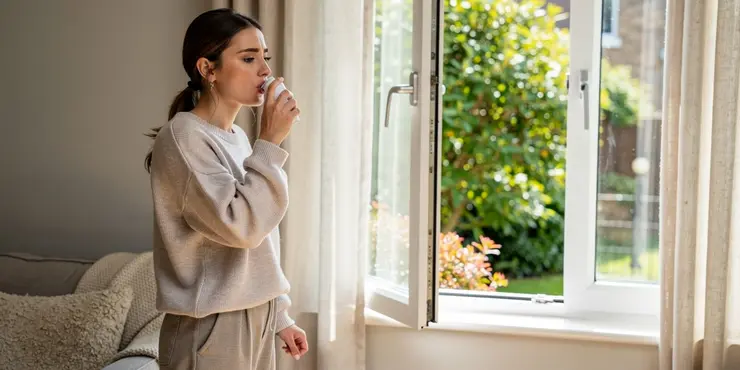
Find Help
More Items From Ergsy search
-

How can asthma attacks be prevented?
Relevance: 100%
-

What triggers asthma attacks?
Relevance: 85%
-

Can asthma be fatal?
Relevance: 70%
-

What is Asthma?
Relevance: 65%
-

Is asthma a serious condition?
Relevance: 64%
-

Can asthma be cured?
Relevance: 64%
-

How do beta-blockers contribute to heart attack prevention?
Relevance: 62%
-

What is an asthma action plan?
Relevance: 61%
-

How is asthma treated?
Relevance: 60%
-

Is it possible to prevent a heart attack?
Relevance: 60%
-

What are the common symptoms of asthma?
Relevance: 58%
-

What causes asthma?
Relevance: 58%
-

An Asthma Explainer with Dr Katherine Hickman
Relevance: 53%
-

Can diet affect asthma?
Relevance: 52%
-

How does air pollution affect asthma?
Relevance: 51%
-

Do calcium channel blockers help in preventing heart attacks?
Relevance: 51%
-
Do over-the-counter medications help in preventing heart attacks and strokes?
Relevance: 51%
-

Are inhalers the only treatment for asthma?
Relevance: 51%
-

Is there a link between hay fever and asthma?
Relevance: 50%
-

How often should someone with asthma see a doctor?
Relevance: 50%
-

Do all patients need medication to prevent heart attacks and strokes?
Relevance: 50%
-

What are some common pollutants that affect asthma sufferers in urban areas?
Relevance: 49%
-

How is asthma diagnosed?
Relevance: 49%
-

What is the role of lifestyle modification in heart attack and stroke prevention?
Relevance: 49%
-

When should one start taking medication for heart attack prevention?
Relevance: 49%
-

Are there different types of asthma?
Relevance: 49%
-

Can stress cause asthma symptoms?
Relevance: 48%
-

Is asthma more common in certain age groups?
Relevance: 48%
-
What is the role of PCSK9 inhibitors in heart attack prevention?
Relevance: 47%
-

Rise in Childhood Asthma Linked to Air Pollution in Urban Areas
Relevance: 45%
-

Can children outgrow asthma?
Relevance: 45%
-

Can exercise trigger asthma symptoms?
Relevance: 45%
-

Heart Attack Stories | NHS
Relevance: 44%
-

UK Study Links Poor Air Quality to Increased Asthma Cases in Urban Areas
Relevance: 43%
-

Heart Attack Stories | NHS
Relevance: 43%
-

Are there mobile apps to track air quality and its impact on asthma?
Relevance: 43%
-

Where can I find information on air pollution and its effect on Asthma for my local area?
Relevance: 42%
-

Can dust mites cause asthma and eczema?
Relevance: 41%
-
What are the risk factors for a heart attack?
Relevance: 41%
-

BSL - How to deal with panic attacks
Relevance: 40%
Understanding Asthma Triggers
Asthma, a common respiratory condition in the UK, can be triggered by a variety of factors. Understanding these triggers is crucial for prevention. Common triggers include allergens like pollen, dust mites, and pet dander. Additionally, environmental factors such as cold weather, air pollution, and strong odours like tobacco smoke can exacerbate symptoms. Stress and respiratory infections also play a significant role in triggering asthma attacks. Identifying and avoiding these triggers is the first step in prevention.
Creating an Asthma Action Plan
An asthma action plan is essential for effectively managing the condition. This personalized plan, developed with the assistance of a healthcare professional, outlines how to handle daily asthma management and provides clear instructions on what to do during an asthma attack. It includes information on medication use, trigger avoidance strategies, and emergency contact details. Regularly reviewing and updating this plan ensures it remains effective and reflects the individual's current condition.
Regular Medication Use
For many people with asthma, the use of prescribed medications is a critical component of preventing attacks. Inhalers are the most common form of medication, consisting of preventer inhalers (usually brown or red) and reliever inhalers (commonly blue). Preventer inhalers contain corticosteroids and help reduce inflammation in the airways, lowering the risk of attacks. Using these regularly as prescribed can significantly minimize symptoms. Reliever inhalers, on the other hand, provide quick relief and should be used in times of need. It is important to follow medical advice and take medications as directed for optimal control.
Environmental Control
Managing the environment is vital in reducing exposure to asthma triggers. This can include maintaining a clean home free from dust and mould, using hypoallergenic bedding, and ensuring good ventilation. During high pollen seasons, consider keeping windows shut and using air filters. If air pollution levels are high, try to stay indoors as much as possible. Smoking should be avoided in the vicinity of asthmatics, and homes should be smoke-free zones.
Lifestyle Modifications
Adopting a healthy lifestyle can further support asthma management. Regular exercise, particularly aerobic activities, strengthens the lungs even though care should be taken to manage exercise-induced symptoms. A balanced diet rich in fruits and vegetables has also been associated with better asthma control. Staying hydrated and practicing relaxation techniques such as yoga or meditation can help manage stress, which is a known asthma trigger.
Monitoring and Regular Check-Ups
Regular monitoring of asthma symptoms and lung function is essential. Devices like peak flow meters can be used daily to monitor how well air moves out of the lungs, providing an early warning of an impending attack. Regular check-ups with a healthcare provider ensure that asthma is well-managed and adjustments to plans or medications can be made promptly. These preventative measures together provide a comprehensive approach to managing and preventing asthma attacks effectively.
Learning About Asthma Triggers
Asthma is a common illness in the UK that affects breathing. It can be triggered, or set off, by many things. Knowing these triggers helps prevent asthma attacks. Common triggers include things like pollen from flowers, tiny dust bugs, and pet fur. Cold weather, dirty air, and strong smells like cigarette smoke can also make asthma worse. Stress and colds are other triggers. Finding out what your triggers are and staying away from them is the first step to stop asthma attacks.
Making an Asthma Plan
An asthma plan helps you manage asthma well. A doctor helps you make this plan. The plan tells you how to manage asthma every day and what to do if you have an asthma attack. It includes information about your medicine, how to avoid triggers, and who to call if you need help. Checking and updating the plan often makes sure it works well for you.
Using Medicine Regularly
Many people with asthma need to take medicine to stop attacks. Inhalers are the most common medicine. They come in two types: preventer inhalers (brown or red) and reliever inhalers (blue). Preventer inhalers help keep the airways clear and reduce the chance of attacks. It is very important to use them every day as your doctor says. Reliever inhalers help quickly during an asthma attack. Always follow your doctor’s advice about using medicine.
Controlling the Environment
Keeping your surroundings clean helps reduce asthma triggers. This means keeping a clean home without dust and mould. Using special bedding that doesn’t cause allergies and having good air flow also help. When there is a lot of pollen outside, keep windows closed and use air filters. If the air is dirty outside, stay indoors as much as you can. Do not smoke near people with asthma, and make sure no one smokes in your home.
Changing Your Lifestyle
Living healthily helps manage asthma better. Exercise like running or swimming makes lungs strong but be careful if it triggers your asthma. Eating fruits and vegetables can help control asthma. Drinking lots of water and doing relaxing things like yoga can help manage stress, which is a trigger.
Checking Your Asthma Regularly
Watching asthma symptoms and lungs is important. You can use tools like peak flow meters every day. This tool helps you know when your breathing is getting worse. Regular visits to the doctor make sure your asthma is under control and changes can be made if needed. These steps help manage asthma and prevent attacks.
Frequently Asked Questions
What lifestyle changes can help prevent asthma attacks?
Avoiding smoking, reducing exposure to allergens, and maintaining a healthy weight can help prevent asthma attacks.
How can regular exercise help in preventing asthma attacks?
Regular exercise strengthens the respiratory system and improves lung function, but it's important to manage exercise-induced asthma with proper warm-ups and medication if needed.
Can avoiding allergens reduce the risk of asthma attacks?
Yes, identifying and avoiding allergens such as pollen, dust mites, and pet dander can significantly reduce the risk of asthma attacks.
How important is it to take prescribed asthma medication?
Taking prescribed medication as directed by a healthcare provider is essential in managing asthma and preventing attacks.
Is it helpful to use a peak flow meter for managing asthma?
Yes, using a peak flow meter can help monitor your lung function and detect early signs of an asthma attack.
What role does stress management play in preventing asthma attacks?
Stress and strong emotions can trigger asthma attacks, so managing stress through relaxation techniques or counseling is beneficial.
Can asthma patients prevent attacks by avoiding certain food triggers?
Yes, some asthma patients may have food sensitivities, so identifying and avoiding these foods can help prevent attacks.
How does maintaining good indoor air quality help with asthma?
Using air purifiers, cleaning regularly, and ensuring good ventilation can reduce indoor allergens and irritants, helping prevent asthma attacks.
What is the importance of having an asthma action plan?
An asthma action plan helps patients recognize triggers, manage symptoms, and know when to seek medical help, effectively preventing attacks.
Should vaccinations be up-to-date to prevent asthma attacks?
Yes, staying up-to-date with vaccinations, like the flu shot, can prevent respiratory infections that might trigger asthma attacks.
Can avoiding smoke exposure help prevent asthma attacks?
Yes, avoiding cigarette smoke, wood smoke, and other pollutants can prevent irritation of the airways and asthma attacks.
How can identifying and avoiding exercise-induced asthma triggers help?
Identifying exercise-induced triggers, such as cold weather or high pollen levels, and taking precautions can help prevent attacks during physical activity.
Are there specific breathing techniques that can help prevent asthma attacks?
Yes, techniques like diaphragmatic breathing and the Buteyko method can improve breath control and help prevent attacks.
Can regular check-ups with a healthcare provider help prevent asthma attacks?
Regular check-ups ensure that your asthma is properly managed and your treatment plan is up to date, which helps in preventing attacks.
What role do antihistamines play in preventing asthma attacks?
Antihistamines can help control allergic responses that might trigger asthma attacks, especially during allergy seasons.
Can staying hydrated help with preventing asthma attacks?
Yes, staying hydrated helps maintain a healthy mucus lining in the airways, which can reduce irritation and prevent attacks.
How does controlling GERD contribute to preventing asthma attacks?
Controlling GERD can reduce acid reflux into the airways, which can otherwise trigger asthma symptoms and attacks.
Is it true that taking Vitamin D can help prevent asthma attacks?
Some studies suggest that adequate Vitamin D levels can support immune function and reduce asthma symptoms, but always consult with a healthcare provider.
Can proper sleep hygiene contribute to preventing asthma attacks?
Yes, good sleep hygiene can improve overall health and reduce stress, which may help in preventing asthma attacks.
How does monitoring air quality index (AQI) help in preventing asthma attacks?
Checking AQI can help you avoid outdoor activities during high pollution days, reducing the risk of respiratory irritation and asthma attacks.
How can I change my life to stop asthma attacks?
To stop asthma attacks, don't smoke, stay away from things that make you sneeze or itch, and keep a healthy body.
How does regular exercise help stop asthma attacks?
Exercise helps your lungs get stronger.
When you exercise, you learn to breathe better.
Stronger lungs mean fewer asthma attacks.
Doing exercise regularly can make you feel healthy and happy.
Here are some tips:
- Start with easy exercises like walking.
- Try to exercise a little bit every day.
- Breathe slowly while you exercise.
- Ask an adult to join you when you exercise.
Exercise helps your lungs get strong and work better. But if you have asthma when you exercise, you should warm up first and take medicine if you need it.
Can staying away from things that cause allergies help prevent asthma attacks?
Yes, staying away from things like pollen, dust mites, and pet fur can help stop asthma attacks.
Why is it important to take asthma medicine from the doctor?
It is very important to take your medicine the way the doctor tells you. This helps you control your asthma and stop attacks from happening.
Can a peak flow meter help with asthma?
A peak flow meter is a tool that can help people with asthma. It measures how fast you can blow air out of your lungs. This helps you know how well your lungs are working.
Using a peak flow meter can help you:
- See if your asthma is getting worse.
- Know if you need to take medicine.
- Tell your doctor how you are doing.
Ask your doctor to show you how to use a peak flow meter. They can help you figure out the best way to use it.
Yes, a peak flow meter can help you check how well your lungs are working. It can also help you know if you might be getting an asthma attack.
How can dealing with stress help stop asthma attacks?
Stress can make it hard to breathe if you have asthma. Learning how to stay calm can help you feel better.
Here are some ideas to help:
- Take deep breaths to feel calm.
- Do something fun, like drawing or playing music.
- Talk to someone who makes you feel good.
- Try yoga or gentle exercise.
Ask an adult for a breathing app or video to help you. Staying relaxed can keep your asthma away.
Feeling stressed or having strong emotions can make asthma worse. It's good to learn ways to relax or talk to someone who can help, like a counselor. This can help you feel better.
Can people with asthma stop attacks by not eating some foods?
Yes, some people with asthma might have problems with certain foods. Finding out which foods cause problems and staying away from them can help stop asthma attacks.
How does keeping indoor air clean help with asthma?
Clean air inside the house can help people who have asthma. Breathing clean air is easier for them.
Here are some ways to keep the air clean:
- Open windows to let fresh air in.
- Use air filters to clean the air.
- Keep dust and smoke away.
Tools like air purifiers can also help make the air clean.
Using machines to clean the air, cleaning the house often, and opening windows for fresh air can make a home healthier. This can help stop asthma attacks.
Why is it important to have an asthma plan?
Having an asthma plan is really helpful. It tells you what to do if you have trouble breathing. It helps you stay safe and healthy.
Here are some things to remember:
- Know your signs. A plan helps you see when your asthma is getting worse.
- Take medicine. A plan tells you when to take your medicine.
- Stay calm. A plan helps you stay calm when you feel bad.
- Ask for help. Talk to adults or doctors when you need help.
Some tools that can help:
- Use pictures. Drawings can help you understand your plan better.
- Ask questions. It's okay to ask a doctor or teacher for help.
An asthma action plan helps people with asthma. It shows you what might cause asthma problems, how to handle symptoms, and when to call the doctor to stop attacks.
Do you need vaccinations to stop asthma attacks?
Yes, getting your shots, like the flu shot, can help stop lung infections that could cause asthma attacks.
Can staying away from smoke help stop asthma attacks?
Asthma is a breathing problem. An asthma attack makes it hard to breathe.
Smoke can make asthma attacks worse.
To help prevent asthma attacks:
- Try to stay away from smoke.
- Do not be around people who are smoking.
If you need help staying away from smoke, you can:
- Ask a friend or family member for support.
- Use a fan or air purifier in your home.
Talk to your doctor if you need more help.
Yes, staying away from cigarette smoke, wood smoke, and other dirty air can stop breathing problems and asthma attacks.
How can we find and stay away from things that cause asthma during exercise?
Sometimes, when we exercise, we can get asthma. It helps us to know what things make our asthma happen. If we figure out these things, we can avoid them. Then, exercising can be easier and safer.
Here are some tips to help:
- Breathe through your nose. This helps warm the air before it gets to your lungs.
- Warm up before you start exercising.
- Try breathing out longer than breathing in. A count of 4:6 helps.
- Use an inhaler if your doctor gave you one.
Exercise can sometimes make you feel unwell, especially if it's cold outside or there are lots of plants around making pollen. Knowing what makes you feel bad and being careful can help you stay safe when you play or do sports.
Can special ways of breathing help stop asthma attacks?
Yes, there are ways to help you breathe better. One way is called belly breathing, where you breathe with your tummy. Another way is the Buteyko method, which helps you control your breathing. These can stop breathing problems before they start.
Can seeing a doctor regularly help stop asthma attacks?
Going to the doctor often can help stop asthma attacks. The doctor can check how you are feeling and give you medicine if needed.
Supportive tools:
- Bring a friend or family member to help remember what the doctor says.
- Write down your questions before you go.
- Use pictures or apps on a phone to help understand things.
Going to the doctor often helps you stay healthy. The doctor checks your asthma and makes sure your medicine is right. This helps stop asthma attacks.
How do antihistamines help stop asthma attacks?
Antihistamines are medicines. They help stop allergic reactions. This can help people with asthma breathe better. When you have asthma, your airways can get tight. Antihistamines help keep airways open.
Tools that can help you understand:
- Use pictures: Find pictures of how the lungs work.
- Watch videos: Look for simple videos about asthma and antihistamines.
- Ask a helper: Talk to a parent, teacher, or carer to explain more.
Antihistamines are medicines that can help you feel better if you have allergies. They can stop things like sneezing and itching, which can sometimes make asthma worse. This is really helpful when there is a lot of pollen or dust in the air. Remember to talk to a grown-up or a doctor before taking any medicine.
Does drinking water help stop asthma attacks?
Yes, drinking water helps keep the body's airways moist. This keeps them from getting irritated and can stop breathing problems.
How does controlling GERD help stop asthma attacks?
GERD is when acid from the stomach comes up into the throat. This can make asthma problems worse. If we control GERD, it can help stop asthma attacks.
Here’s how to control GERD:
- Eat small meals.
- Avoid spicy and fatty foods.
- Don’t lie down right after eating.
- Raise the head of your bed.
These steps can help keep asthma under control too. If you need more help, talk to a doctor. They can give more advice.
Taking care of GERD can help stop stomach acid from moving up into the throat and airways. This can stop asthma symptoms and attacks from happening.
Can Vitamin D stop asthma attacks?
Some studies say that having enough Vitamin D can help your body fight off illnesses and might help with asthma. But you should always talk to a doctor.
Can good sleep habits help stop asthma attacks?
Yes, sleeping well can help you stay healthy and feel less stressed. This might stop asthma attacks from happening.
How can checking air quality help stop asthma attacks?
Asthma can make it hard to breathe. Bad air can make it worse.
The Air Quality Index (AQI) tells us if the air is clean or dirty.
If the AQI number is high, the air is bad. This can cause asthma attacks.
By checking AQI, we can know when to stay inside or wear a mask.
Some tools can help, like phone apps that show AQI numbers.
Ask an adult to help you check the AQI so you can stay safe.
Looking at the AQI is a good idea. It helps you know when the air is dirty. On those days, try not to go outside too much. This way, you can keep your lungs safe and breathe better. It’s good for people with asthma, too.
Useful Links
This website offers general information and is not a substitute for professional advice.
Always seek guidance from qualified professionals.
If you have any medical concerns or need urgent help, contact a healthcare professional or emergency services immediately.
Some of this content was generated with AI assistance. We’ve done our best to keep it accurate, helpful, and human-friendly.
- Ergsy carfully checks the information in the videos we provide here.
- Videos shown by Youtube after a video has completed, have NOT been reviewed by ERGSY.
- To view, click the arrow in centre of video.
- Most of the videos you find here will have subtitles and/or closed captions available.
- You may need to turn these on, and choose your preferred language.
- Go to the video you'd like to watch.
- If closed captions (CC) are available, settings will be visible on the bottom right of the video player.
- To turn on Captions, click settings .
- To turn off Captions, click settings again.
More Items From Ergsy search
-

How can asthma attacks be prevented?
Relevance: 100%
-

What triggers asthma attacks?
Relevance: 85%
-

Can asthma be fatal?
Relevance: 70%
-

What is Asthma?
Relevance: 65%
-

Is asthma a serious condition?
Relevance: 64%
-

Can asthma be cured?
Relevance: 64%
-

How do beta-blockers contribute to heart attack prevention?
Relevance: 62%
-

What is an asthma action plan?
Relevance: 61%
-

How is asthma treated?
Relevance: 60%
-

Is it possible to prevent a heart attack?
Relevance: 60%
-

What are the common symptoms of asthma?
Relevance: 58%
-

What causes asthma?
Relevance: 58%
-

An Asthma Explainer with Dr Katherine Hickman
Relevance: 53%
-

Can diet affect asthma?
Relevance: 52%
-

How does air pollution affect asthma?
Relevance: 51%
-

Do calcium channel blockers help in preventing heart attacks?
Relevance: 51%
-
Do over-the-counter medications help in preventing heart attacks and strokes?
Relevance: 51%
-

Are inhalers the only treatment for asthma?
Relevance: 51%
-

Is there a link between hay fever and asthma?
Relevance: 50%
-

How often should someone with asthma see a doctor?
Relevance: 50%
-

Do all patients need medication to prevent heart attacks and strokes?
Relevance: 50%
-

What are some common pollutants that affect asthma sufferers in urban areas?
Relevance: 49%
-

How is asthma diagnosed?
Relevance: 49%
-

What is the role of lifestyle modification in heart attack and stroke prevention?
Relevance: 49%
-

When should one start taking medication for heart attack prevention?
Relevance: 49%
-

Are there different types of asthma?
Relevance: 49%
-

Can stress cause asthma symptoms?
Relevance: 48%
-

Is asthma more common in certain age groups?
Relevance: 48%
-
What is the role of PCSK9 inhibitors in heart attack prevention?
Relevance: 47%
-

Rise in Childhood Asthma Linked to Air Pollution in Urban Areas
Relevance: 45%
-

Can children outgrow asthma?
Relevance: 45%
-

Can exercise trigger asthma symptoms?
Relevance: 45%
-

Heart Attack Stories | NHS
Relevance: 44%
-

UK Study Links Poor Air Quality to Increased Asthma Cases in Urban Areas
Relevance: 43%
-

Heart Attack Stories | NHS
Relevance: 43%
-

Are there mobile apps to track air quality and its impact on asthma?
Relevance: 43%
-

Where can I find information on air pollution and its effect on Asthma for my local area?
Relevance: 42%
-

Can dust mites cause asthma and eczema?
Relevance: 41%
-
What are the risk factors for a heart attack?
Relevance: 41%
-

BSL - How to deal with panic attacks
Relevance: 40%


